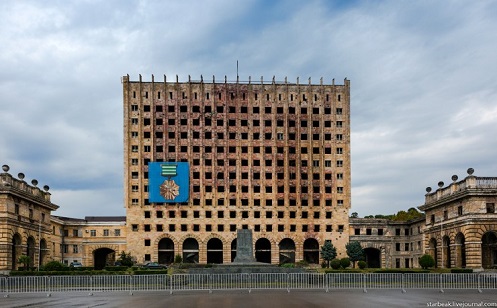De-facto Abkhazia: ‘Alliance and Integration’ treaty with Moscow will be signed this year

A Kremlin proposed new treaty on ‘Alliance and Integration’ with Georgia’s breakaway region Abkhazia and Russia will be signed by the end of this year, Abkhazia’s de-facto leader Raul Khajimba announced.
The draft of the treaty presented by Moscow outlined joint cooperation with de-facto Abkhazia in defence and security, economic harmonisation with the Eurasian union, social protection and foreign policy issues.
The document, titled "Agreement Between the Russian Federation and the Republic of Abkhazia on Alliance and Integration”, envisaged setting up a joint Russian-Abkhaz group of forces for collective defence and joint law enforcement structures for fighting crime.
Military cooperation
According to the draft treaty, an attack against one could be considered an attack against the other and consequently official Sokhumi and Moscow would provide "necessary assistance” to the other, including military, in the case of such an attack. Furthermore, Moscow has offered to provide Sokhumi with "complete freedom of movement” across the Russian-Abkhaz state border.
However, the draft document also says that this measure would be subject to "unspecified restrictions”, which would be imposed for security reasons. Abkhazia’s newly elected de-facto leader believed the treaty would enhance the region’s cooperation with Moscow.
"It is crucial for us to strengthen and enhance our cooperation with Russia. That is also a goal of the new agreement, which we plan to sign before the end of this year,” Khajimba said during his speech at an event marking the 22nd anniversary of the Abkhazia’s Armed Forces on October 11.
"It will allow us to carry out a large-scale modernisation of our Army, bring to a higher level its material-technical support and significantly increase salaries and social protection of servicemen.”
Georgian reaction
Meanwhile, Georgia’s Defence Minister Irakli Alasania believed the treaty would not be legal as it would be approved by the de-facto authority. He was confident that with pressure from the international community Georgia can begin the de-occupation of Abkhazia.
"The bill that will be approved by the self-recognised, so-called country’s parliament will not have international legal value to us. Abkhazia, as well as Tskhinvali, are integral parts of Georgia,” Alasania said on Tuesday.
"I am confident that with the pressure of the international society, we will start the de-occupation process.”
Points of Russian-Abkhazian integration
Furthermore, within 18 months of de-facto Sokhumi and Moscow signing the treaty, Sokhumi will have to put its customs legislation in line with regulations of the Russian-led Eurasian Economic Union.
Moscow pledged to "co-finance” a gradual salary increase of employees of state-funded entities in Abkhazia, including in healthcare, education, social service and cultural sectors.
A gradual pension increase for Russian citizens who lived in Abkhazia was also defined in the document and funded by Russia. As for the foreign policy course of de-facto Abkhazia, Russia pledged to take efforts to "broaden” international recognition of Abkhazia.
In particular, the document envisaged to "create preconditions” to help Abkhazia become a member of the international organisations. Khadzhimba has already presented a draft agreement on ‘Alliance and Integration’ to members of the National Assembly in the parliament of de-facto Abkhazia.
Further discussion
Abkhazia’s vice president Vitaly Gabniya said they would present the document for general discussion, just as it was presented by the Russian Federation "without retouching”.
"Once society is familiar with it, we will be able to talk about it more in detail. The project contains the main directions of cooperation. Specific issues need clarification,” Gabniya said.
Now, Abkhazia and Tskhinvali region are recognized as independent nations by four countries - Russia, Nicaragua, Venezuela and Nauru.
 Tweet
Tweet  Share
Share